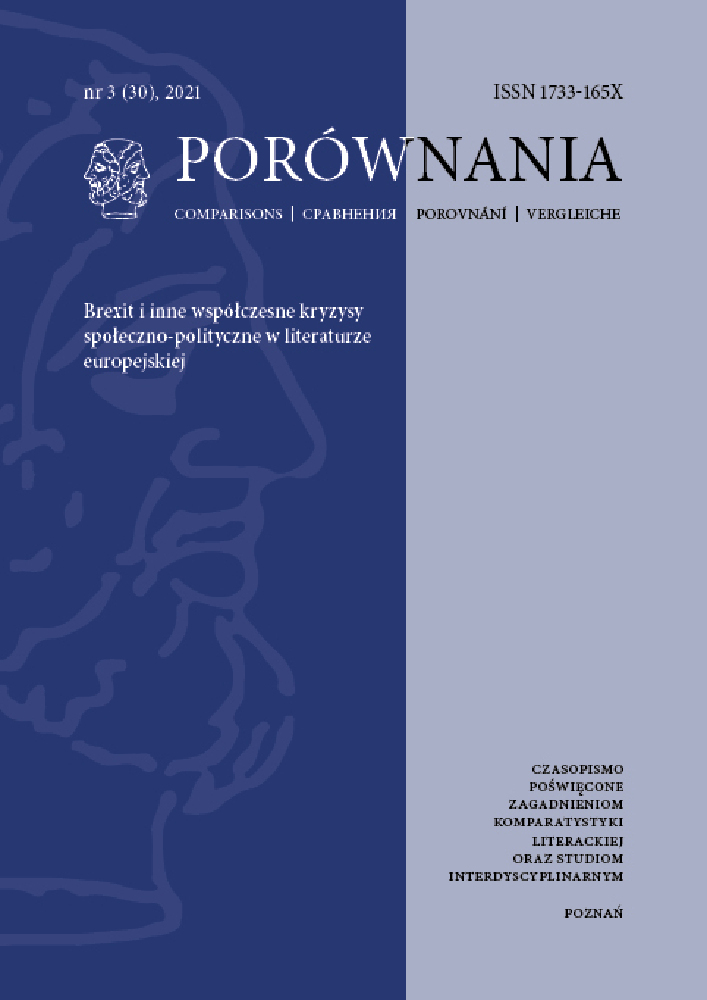Abstrakt
Artykuł ma na celu ukazać, w jaki sposób tradycje science fiction, a przede wszystkim literatury inwazji, stanowią ideologiczne tło dla lektury The Last Day Andrew Hunter Murraya jako powieści o brexicie. Opierając się na niepokojących wizjach przyszłości, w których wróg czai się za każdym rogiem, a jedynym ratunkiem jest całkowita izolacja od świata, książka Murraya jest tu odczytywana jako brexitowe spełnienie marzeń, w których Brytania znów jest wielka, niezależna i niezanieczyszczona obcym elementem. Przywołując mity, które koncentrują się wyłącznie na chwale i wygodnie „zapominają” o ciemnych stronach imperium, powieść pokazuje, że fantazje przeszłości są tak odległe jak fantazje przyszłości, a utrata świata, którego nigdy nie było, staje się analogią do utraty planety, na której wciąż możliwe jest życie.
Bibliografia
Andrews, Kehinde. The New Age of Empire: How Racism and Colonialism Still Rule the World. Penguin UK, 2021. E-book.
Barry, Aoife. “Britain Has Pride about Not Succumbing to Fascism in the 20th Century—I’m Suggesting It Could Happen in the 21st.” The Journal.Ie. 7 May 2020. https://jrnl.ie/5031116. Accessed 28 April 2021.
Bulfin, Ailise. “The Natural Catastrophe in Late Victorian Popular Fiction: ‘How Will the World End?’.” Critical Survey 27.2 (2015a): 81–101. https://doi.org/10.3167/cs.2015.270207
Bulfin, Ailise. “‘To Arms!’: Invasion Narratives and Late-Victorian Literature.” Literature Compass 12.9 (2015b): 482–496. https://doi.org/10.1111/lic3.12253
Keep, C.J. “Fearful Domestication: Future-War Stories and the Organization of Consent, 1871–1914.” An Interdisciplinary Critical Journal 23.3 (1990): 1–16.
Matin, A. Michael. “The Creativity of War Planners: Armed Forces Professionals and the Pre–1914 British Invasion-Scare Genre.” ELH 78.4 (2011): 801–831.
Matin, A. “Gauging the Propagandist’s Talents: William Le Queux’s Dubious Place in Literary History. Part One.” Critical Survey 32. 1/2 (2020): 79–98. https://doi.org/10.3167/cs.2019.112604
Mondal, Anshuman A. “Scratching the Post-Imperial Itch.” Brexit and Literature: Critical and Cultural Responses. Ed. Robert Eaglestone. London and New York: Routledge, 2018. 82–91.
Mukherjee, Ankhi. “Migrant Britain.” Brexit and Literature: Critical and Cultural Responses. Ed. Robert Eaglestone. London and New York: Routledge, 2018. 73–81.
Murray, Andrew Hunter. The Last Day. London: Hutchinson, 2020.
O’Toole, Fintan. Heroic Failure: Brexit and the Politics of Pain. Head of Zeus, 2018. E-book.
Rau, Petra. “Autumn after the Referendum.” Brexit and Literature: Critical and Cultural Responses. Ed. Robert Eaglestone. London and New York: Routledge, 2018. 31–43.
Sanghera, Sathnam. Empireland: How Imperialism Has Shaped Modern Britain. Penguin UK, 2021. E-book.
Shaw, Kristian. “BrexLit.” Brexit and Literature: Critical and Cultural Responses. Ed. Robert Eaglestone. London and New York: Routledge, 2018. 15–30.
Tomlinson, Sally. Education and Race from Empire to Brexit. Bristol: Policy Press, 2019.
Turnnige, Sarah. “Neighbours’ Horror as Racist ‘Happy Brexit Day’ Posters Put up in Norwich Tower Block.” HuffPost UK. 2 Feb. 2020. https://tinyurl.com/happybrexitday. Accessed 28 April 2021.
Varty, Anne. “Poetry and Brexit.” Brexit and Literature: Critical and Cultural Responses. Ed. Robert Eaglestone. London and New York: Routledge, 2018. 59–65.
Wells, H.G. “The Star.” The Short Stories of H.G. Wells. London: Ernest Benn, 1957. 644–655.
Licencja
Utwory opublikowane w czasopiśmie „Porównania”, na platformie Pressto należącej do Uniwersytetu im. Adama Mickiewicza w Poznaniu są udostępniane na licencji Creative Commons Uznanie autorstwa - Bez utworów zależnych 4.0 Międzynarodowe (CC BY-ND 4.0)
Tym samym wszyscy zainteresowani są uprawnieni do korzystania z utworów opublikowanych pod następującymi warunkami:
-
uznania autorstwa — czyli obowiązek podania wraz z rozpowszechnianym utworem informacji o autorstwie, tytule, źródle (odnośniki do oryginalnego utworu, doi) oraz samej licencji
-
bez utworów zależnych — remiksując, przetwarzając lub tworząc na podstawie utworu, nie wolno rozpowszechniać zmodyfikowanych treści.
-
brak dodatkowych ograniczeń — nie można korzystać ze środków prawnych lub technologicznych, które ograniczają innych w korzystaniu z utworu na warunkach określonych w licencji.
Uniwersytet im. Adama Mickiewicza w Poznaniu zachowuje prawo do czasopisma jako całości (układ, forma graficzna, tytuł, projekt okładki, logo itp.).
Autor zachowuje prawa majątkowe, ale udziela zgody Uniwersytetowi im. Adama Mickiewicza w Poznaniu na wykorzystanie dzieła. Autorzy tekstów zakwalifikowanych do publikacji proszeni są o wypełnienie podpisanie i przesłanie umowa (PL) agreement (EN)
Agreement for granting a royalty-free license to works with a commitment to grant a CC sub-license





